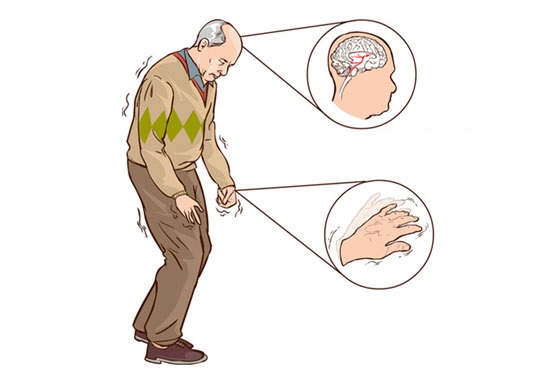Should Parkinson’s be treated surgically or conservatively?
- Normal Liver Cells Found to Promote Cancer Metastasis to the Liver
- Nearly 80% Complete Remission: Breakthrough in ADC Anti-Tumor Treatment
- Vaccination Against Common Diseases May Prevent Dementia!
- New Alzheimer’s Disease (AD) Diagnosis and Staging Criteria
- Breakthrough in Alzheimer’s Disease: New Nasal Spray Halts Cognitive Decline by Targeting Toxic Protein
- Can the Tap Water at the Paris Olympics be Drunk Directly?
Should Parkinson’s be treated surgically or conservatively?
Should Parkinson’s be treated surgically or conservatively? The treatment of patients with Parkinson’s disease should be carried out according to the stage. The treatment method must be selected correctly in different stages of Parkinson’s disease. Scientific treatment can improve the patient’s life and quality of life. Specific to whether each patient is suitable for surgery, professional evaluation must be carried out.

A 62-year-old Lady has been suffering from Parkinson’s disease (PD) for more than 10 years. She has stiffness in her upper limbs with involuntary shaking. She has difficulty getting up and sitting, walking, falling easily, and having difficulty taking care of herself. Especially in the past year, memory has decreased significantly, mood is low, the effect of medication is not satisfactory, and I am too worried about surgery (DBS) treatment, and hesitate between conservative treatment and surgical treatment.
This lady’s situation is not an isolated case. Many Pa friends or family members have such questions. Today, our Dean Jie will give you an in-depth interpretation. Let’s listen to what Dean Dean says!
Drugs are the preferred treatment for early Parkinson’s patients, but Parkinson’s disease is a chronic progressive neurological disease. As time goes by, the patient’s condition will gradually get worse. After the honeymoon period of drug treatment, the condition will become difficult to control.
According to the postoperative follow-up results of Parkinson’s disease patients with a disease course of 5 years, 8 years, 15 years, 20 years or even 26 years, patients with a shorter course of disease have a better prognosis than patients with a longer course of disease. Therefore, although drugs are recommended as the first choice for treatment, there are Patients with surgical indications should undergo surgical treatment as soon as possible, and the combination of surgery and medical treatment can achieve better treatment results.
Patient selection
1. Patient’s age
At present, there is no clear restriction on the age of surgery, and elderly patients are not an absolute contraindication to surgery. The maximum age of patients undergoing surgery in our hospital is 81 years old, and the postoperative results are also very good. More elderly patients need to consider the following factors:
- Perioperative complications;
- Co-morbidity: Older patients will have more cardiovascular and cerebrovascular diseases, diabetes and other chronic diseases, which increase the risk of surgery;
- Older patients are more prone to cognitive dysfunction;
- More prone to hallucinations;
- The incidence of resistance to levodopa is high.
2. Surgery should be considered for sports complications that cannot be satisfactorily controlled by drugs
Motor complications are the most common symptoms of Parkinson’s patients in the middle and late stages, mainly including end-of-dose phenomenon and dyskinesia.
End-of-dose phenomenon: The first occurrence of sports complications is the end-of-dose phenomenon, which is mainly manifested in the shortening of the effective duration after taking the drug. It can last for 4-5 hours or even longer after taking the drug, but now it can only maintain 1-2 When the drug fails, in addition to recurring motor symptoms such as shaking, slowness, and stiffness, irritability, anxiety, limb pain and even breathing difficulties may occur, which seriously affects the quality of life.
Dyskinesia: It often indicates that the disease has entered an advanced stage. The most common one is dosing peak dyskinesia. Patients mainly experience involuntary movements of the extremities (hands or feet) or trunk when the blood concentration reaches the peak after taking the drug. At this time, the patient trembles and moves Slowness and muscle stiffness are significantly relieved.
The main reason for the emergence of dose peak dyskinesia is that the dose of a single dose is too large. Therefore, to alleviate the dyskinesia, the dose of the single dose must be reduced. However, the reduction of the dose of the drug will shorten the duration of the drug effect. Therefore, at this time, surgical treatment is an effective choice.
3. No contraindications
The patient has no dementia, no severe hallucinations and symptoms of anxiety and depression.
The key to surgery
DBS surgery is different from other surgical procedures. Whether the patient can benefit depends on three factors:
- 1. Detailed evaluation before surgery;
- 2. Precise implantation of intraoperative electrodes;
- 3. Effective program control after operation;
Conclusion
The treatment of patients with Parkinson’s disease should be carried out according to the stage. The treatment method must be selected correctly in different stages of Parkinson’s disease. Scientific treatment can improve the patient’s life and quality of life. Specific to whether each patient is suitable for surgery, professional evaluation must be carried out.
(source:internet, reference only)
Disclaimer of medicaltrend.org



